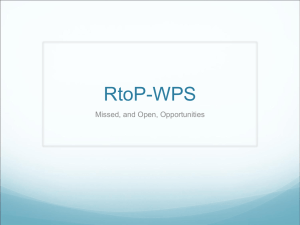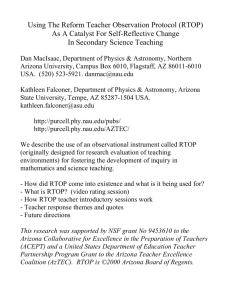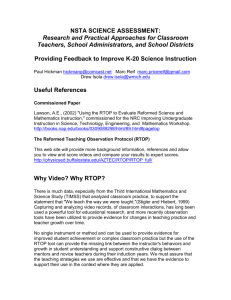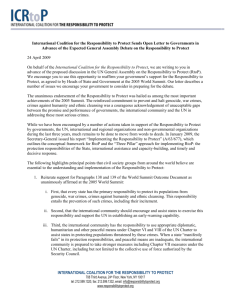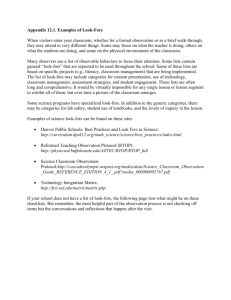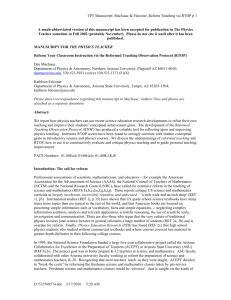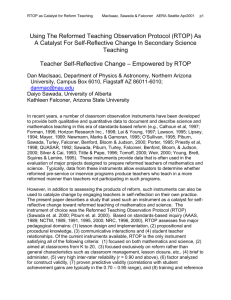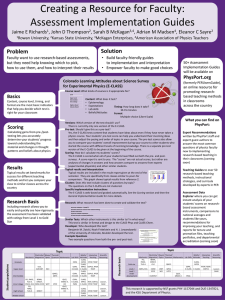AAPT_DR04_RTOP_Slides
advertisement
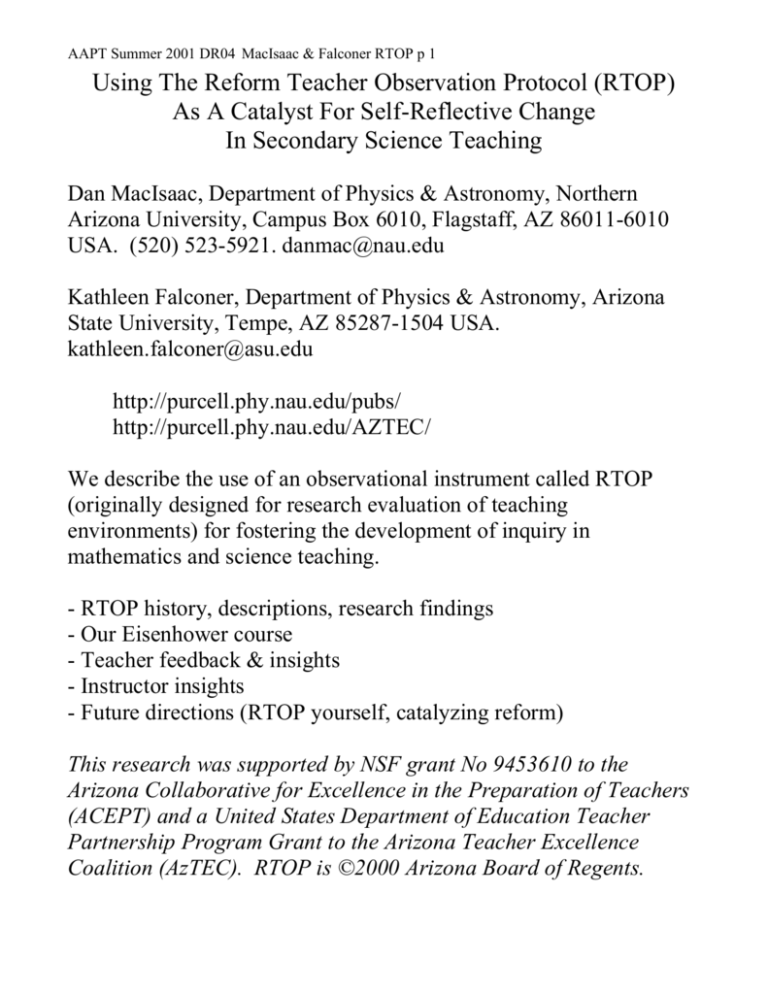
AAPT Summer 2001 DR04 MacIsaac & Falconer RTOP p 1 Using The Reform Teacher Observation Protocol (RTOP) As A Catalyst For Self-Reflective Change In Secondary Science Teaching Dan MacIsaac, Department of Physics & Astronomy, Northern Arizona University, Campus Box 6010, Flagstaff, AZ 86011-6010 USA. (520) 523-5921. danmac@nau.edu Kathleen Falconer, Department of Physics & Astronomy, Arizona State University, Tempe, AZ 85287-1504 USA. kathleen.falconer@asu.edu http://purcell.phy.nau.edu/pubs/ http://purcell.phy.nau.edu/AZTEC/ We describe the use of an observational instrument called RTOP (originally designed for research evaluation of teaching environments) for fostering the development of inquiry in mathematics and science teaching. - RTOP history, descriptions, research findings - Our Eisenhower course - Teacher feedback & insights - Instructor insights - Future directions (RTOP yourself, catalyzing reform) This research was supported by NSF grant No 9453610 to the Arizona Collaborative for Excellence in the Preparation of Teachers (ACEPT) and a United States Department of Education Teacher Partnership Program Grant to the Arizona Teacher Excellence Coalition (AzTEC). RTOP is ©2000 Arizona Board of Regents. AAPT Summer 2001 DR04 MacIsaac & Falconer RTOP p 2 RTOP Historical Background: developed for ACEPT ($5M / 5yr NSF CETP) better prepare K-12 teachers of science and mathematics CETPs were College of Science + College of Ed; 'break cycle' CETP-wide instrument (assess intro univ science courses taken by preservice teachers & teacher's own lessons after graduation) adapted from Horizons instrument; BUT fast (1hr); in-and-out Science and Math only ASU team + Sawada & Piburn + others constructivism, discourse, standards & inquiry adopted by AzTEC ($15M / 5yr DoEd Tchr Partnership Pgm) recruit, better prepare, induct and retain SMET tchrs NAU ASUUofAz university faculties (tchr subject instr, methods) 'feeder' community colleges (recruiting school districts (recruiting, induction) NAU / FUSD / CCC BIO100, ENV101, PHY111/112, PHS101, MAT this yr SCI308/351/352 sec sci ed methods courses 1999 Eisenhower course NAU (31 tchrs; 8+2 FUSD) evaluation and catalyst for 118 FUSD mentoring tchrs AAPT Summer 2001 DR04 MacIsaac & Falconer RTOP p 3 Our idea: take a research-grade and confirmed instrument and use it to catalyze teacher self-reflective change. Teaching to the test is ok if it's a good test. Gr7 teacher@FUSD RTOP Presentations / publication submissions: AERA, NARST, AETS, AAPT 2001; JRST & JCST (submitted), JSTE & TPT (in preparation). The Instrument: 'Reform' Teacher Observation Protocol What does'Reform' mean? A high RTOP Score!! (Aronsian operational definition) RTOP based upon AAAS, NCTM, NRC standards; constructivist, collaborative inquiry We claim that RTOP measurements of reform in physics lessons are a sophisticated, gradiated and quantitative measure of classroom reform techniques that supersume the teaching methods referred to as Interactive Engagement by R. Hake (1998) and those referred to as Cooperative Learning by Johnson, Johnson and Smith (1991). For details, see the instrument itself: AAPT Summer 2001 DR04 MacIsaac & Falconer RTOP p 4 PHYSICS INTERPRETATIONS: III. Lesson Design and Implentation. The creation of physics lessons that: - respect student preconceptions and knowledge; - foster learning communities; - explore before formal presentation; - seek and recognize alternative approaches; and - include student ideas in classroom direction. IV. Content (Propositional Knowledge). Teachers knowing their physics and teaching lessons that: - involve fundamental concepts of physics; - promote coherent understanding across topics and situations; - demonstrate teacher content knowledge (e.g. apparently 'unrelated' questions); - encourage appropriate abstraction; and - explore and value interdisciplinary contexts and real world phenomena. IV. Content (Procedural Knowledge). Physics lessons that use scientific reasoning to: - use a variety of representations to represent phenomena; - make and test predictions, hypotheses, estimates or conjectures; - are actively engaging and thought-provoking and include critically assessment; - demonstrate metacognition (critical self-reflection); and - show intellectual dialogue, challenge, debate negotiation, interpretation and discourse. V. Classroom Culture (Communicative Interactions). The use of student discourse to modify the locus of lesson control such that: - students communicate their own ideas in a variety of methods; - teacher's questions foster divergent modes of thinking; - lots of student, particularly inter-student talk; - student questions and comments shape discourse (the 'teachable moment'); and - there is a climate of respect and expectation for student contributions. AAPT Summer 2001 DR04 MacIsaac & Falconer RTOP p 5 V. Classroom Culture (Student-Teacher Relationships). Lessons interactions where: - students actively participate (minds-on, hands-on) and set agendas; - students take primary and active responsibility for their own learning; - the teacher is patient (plays out student initiatives, and is silent when appropriate); - the teacher acts as a resource and students supply initiative; and - the teacher is a listener. The RTOP instrument establishes an operational definition for reform teaching by quantifying twenty-five observable behaviors each of which is scored from 0 - 4 as follows: 0 1 2 3 4 the behavior never occurred the behavior occurred at least once occurred more than once; very loosely describes the lesson a frequent behavior, fairly descriptive of the lesson pervasive or extremely descriptive of the lesson RTOP lesson scores made by untrained observer's scores do not have the inter-rater reliability and validity that trained researchers have when using the RTOP rubric and data generated by untrained RTOP observers should be used for self-reflective, personal development or peer mentoring, not research purposes or for formal teacher assessment. In particular, teachers often over-rate one another, and use inference inappropriately. More detailed, online RTOP training guides are currently proposed for development to try and address these issues. AAPT Summer 2001 DR04 MacIsaac & Falconer RTOP p 6 Scoring each of these twenty-five items from 0 - 4 results in a lesson score ranging from 0 – 100 describing the degree of reform present in a lesson. For physics lessons we have observed, some typical approximate scores are: traditional university lecture (passive) university lecture with demonstrations (some student participation) traditional high school physics lecture (with student questions) partial HS reform (some groupwork; most discourse still with teacher) medium sized (n > 50) university lectures with Mazur-like group- work (ConcepTests) and a student Personal Response System the author’s modified (whiteboards etc) large (n > 150) lectures modeling curriculum (varies with amount and quality of discourse) < 20 < 30 < 45 < 55 65-75 70-75 65-99 These typical scores are quite generalized, and large departures from these have been observed. AAPT Summer 2001 DR04 MacIsaac & Falconer RTOP p 7 'Research-Grade' Claims for RTOP: Piburn, M., Sawada, D., Turley, J., Falconer, K., Benford, R., Bloom, I., & Judson, E. (2000). Reformed Teaching Observation Protocol (RTOP): Reference Manual. (ACEPT Technical Report No. IN00-3). Tempe, AZ: Arizona Collaborative for Excellence in the Preparation of Teachers. Available from ERIC (pending); <http://purcell.phy. nau.edu/pubs/RTOP>. Discusses theory & philosophy, standards, development, psychometrics (inter-rater reliability, factor analysis, reliability & validity) and correlation with normalized achievement gains for 14 univ / college classes. RTOP reliabilities on 4 / 5 subscales: R2 > 0.87; total R2 = 0.946; for physics and math classes R2 = 0.954 Correlations between RTOP and normalized conceptual gains: Physical Science 110 (n = 6) R = 0.88 Physics 121 (n = 4) R = 0.97 Mathematics (n = 6) Conceptual understanding R = 0.94 Number Sense R = 0.92 No relationship for computational skills! Lawson, A. E., Benford, R., Bloom, I., Carlson, M. P., Falconer, K. F., Hestenes, D. O., Judson, E., Piburn, M. D., Sawada, D., Turley, J., & Wyckoff, S. (2001). Reforming and evaluating college science and mathematics instruction: Reformed teaching improves student achievement. Journal of College Science Teaching, in review. Discusses links between RTOP scores and student achievement gains for six physical science and four university physics classes, others (mathematics, biology, geology, chemistry). RTOP inter-rater reliabilities are very high with training (16 pairs, r = 0.94; 4 pairs, r = 0.99; 7 pairs, r = 0.97; 7 pairs, r = 0.97, 6 pairs, r = 0.94; 5 pairs, r = 0.93; 9 pairs, r = 0.90) Research literature claim: RTOP-scored teaching reforms lead to substantial improvement in student achievement. AAPT Summer 2001 DR04 MacIsaac & Falconer RTOP p 8 This study: Summer 2000 Eisenhower 3 wk Program for secondary (7-12) math & science teachers; physics (modeling) -led and inspired. 37 participants; 28 inservice teachers; 4 from charter schools; 6 middle school teachers; only 3 straight HS physics, most HS mixed collected journals, focus groups, RTOP scores, surveys, videotapes, unit plans (still analyzing) Week 1 Day 1: AM - Focus group in teacher personal goals for the workshop. PM - RTOP introductory session: RTOP Teacher Introduction Sessions history of instrument; why we care show and RTOP 'seductive' video; call out scores form small groups by score variation, discuss and debate show and RTOP modeling physics video large group discussion Homework: comment on RTOP through a self RTOP evaluation Day two AM: focus group discussion on RTOP reflection homework. Remainder of week one: participants act as students and work through examples from introduction and unit one of modeling physics curriculum, using reform techniques, taught by master teachers. Participants RTOP, discuss and analyze master teacher's performances, lessons situations and curricula in reflections, focus groups and RTOP scores. AAPT Summer 2001 DR04 MacIsaac & Falconer RTOP p 9 Week 2: Participants group and develop own standards-based (NSES & Az Stds) integrated science and math lessons, incorporating reform methods as seen in modeling and assessed by RTOP. Groups of teachers present their lessons to one another as teachers / students (videotaped), RTOPping their peers and providing reflective feedback. Lessons revised and placed online for distribution to all course teachers. Week 3: Participants re-group and repeat week 2 working on new lessons in new groups. All lesson materials at http://purcell.phy.nau.edu/ under Summer 2000 SCI599. All videotaped lessons being re-RTOPped now. Teacher Insights from the RTOP / reform lesson development experience: - RTOP is a valuable rubric for lesson planning / design - RTOP justifies, defends, validates reform teaching (backlash) by reinforcing nontraditional decisions taken on issues such as pacing, student-centeredness - RTOP provides learner-centered assessment of learning community for professional growth of teachers (contrast M. Hunter's Elements of Effective Instruction instructional rubric) - trust (misuse) and control (comfort) are critical Teacher preparation researcher insights: - RTOP provides an operational definition for reform teaching - RTOP promotes a common thought and language of reform (Vygotsky & Orwell; classroom culture, respect, learning community, divergent thinking, preconceptions, negotiation, dialog -- these must be refined like force & power in physics) - RTOP has extremely desirable research characteristics AAPT Summer 2001 DR04 MacIsaac & Falconer RTOP p 10 Some teacher's quotes from MacIsaac, D.L. & Falconer, K.A. (2001). Using the reform teacher observation protocol (RTOP) as a catalyst for self-reflective change in secondary science teaching. American Education Research Association Division K. (ERIC identifier pending, available at http://purcell.phy.nau.edu/pubs) A couple of the students made remarks that reveal rather succinctly how the RTOP had helped transform their understanding of their own teaching practice. The RTOP has changed how I will teach science from now on. Um.. it has identified for me some.. some really fairly simple adjustments that I can make that I think will be extremely helpful for my students and has helped to identify for me uh.. some of the frustrations that I have felt when teaching my students. You know... knowing that I myself had a model that I was following but never actually getting that clearly across to my students and realizing that.. that is a problem. So now that I have identified it, I can deal with it and I find that it is not as hard to deal with as you might think it just takes a little practice. Um.. lets see, Ah.. the high point was really taking the RTOP and getting ideas for how to transform the lesson plan, like keep the lesson plan you already wrote, keeping it RTOP. What we can incorporate that we didn’t already do and also just having that solid reference for how.. how to improve um.. my lessons. That I know that if I get a high RTOP score, my students will, you know have better conceptual understanding. So its very easy for me to go through this list to improve. I also like the experience of friends and I really appreciate carrying everyone’s ideas here. Participant journals also showed remarkable changes in language use. While early reflections contained many general terms and concepts such as “stuff”, “active”, “hands-on” and “fun”, participants were now using words such as “students’ prior knowledge”, “face their misconceptions trough experimentation”, “engaged students as members of a learning community”, “agree on method of testing”, “student exploration” and the like. AAPT Summer 2001 DR04 MacIsaac & Falconer RTOP p 11 Final focus group interviews also made interesting juxtaposition with initial interviews held after the end of RTOP training on Day 2. At that time, several participants expressed extreme disbelief with regards to the reforms espoused by RTOP: …Yeah, just srop and say I ain’t doing this RTOP thing... just an example; this kid was making fun of this one kid so I sent him down to take the attendance, and said look you guys you can’t keep doing this, this is not right to do to somebody, O.K. how would you like it if we did this to you. O.K. were going to talk to about, make something up to someone about... It’s not an RTOP lesson, and that comes up so many times in the middle school, you know. …I’ll agree with that, that it is, there are certain in a traditional mathematics curriculum the way its sequenced traditionally.. it.. there are something’s that lend them selves wonderfully to their investigative constructavist approach and there are something’s that in first place don’t, but the longer.. the more experience you have in doing it the more you learn to look at specific ideas and topics, and concepts from.. from.. the tools and the back ground of how do I get the kids to investigate this before I show them step one, step two, step three, here’s how you get the answer and.. think about what the answer means now. AAPT Summer 2001 DR04 MacIsaac & Falconer RTOP p 12 Other participants expressed fear of the assessment of their teaching practices by classroom visitors, particularly from school administrators who they felt would not be able to appropriatly use the instrument. Participants in general felt that RTOP was most appropriate for peer mentoring. …lets say that the students came up with what you were going to do but that’s not the day I was evaluated, the next day the evaluator came in and were doing what the students and I’m going to get a zero on this day, but it will certainly student directed, but there no evidence, there’s no evidence that they came up with the idea which is one of the particular indicators, that they actually initiate the idea. So that’s not always obvious on a daily basis. …when you do that it becomes a top down issue, you know it comes and (gets you?) the... readminstration and when you do a peer-peer... When its peer-peer it is such, it is taken as something as let me help you, let us help each other. You know its a sharing sort of difference opposed to the administrative instrument they use as a check... One participant made an interesting comment describing her own previous classroom assessments by school administrators as 'mystical', referring to their unfocussed and unhelpful qualities… Except for a lot of comments that good things weren’t happening, you know there was a lot of people who were extremely mystical that there were, that she wasn’t at all a (good) teacher, just give her... you know that’s comments that came out yesterday, and so.. AAPT Summer 2001 DR04 MacIsaac & Falconer RTOP p 13 Supplementary FUSD teacher quotes from this past academic year: The instrument itself is valuable in helping teachers focus on improving their lessons. It reminds the instructor of ways of approaching teaching that aren't traditionally assessed. I think RTOP validates a lot of the things that I have been trying to do in my classroom and with my teaching and I look fo ward to being evaluated to see where I am [teaching] at. However, I did do a couple of labs this past semester in a different way than I have previously. We did the % water in a hydrate lab in a more “exploratory” fashion. Rather than having students do the lab “cookbook” fashion, we brainstormed some ideas as a class, and then student groups wrote their procedures and data on a whiteboard. In general, this approach worked much better than simply having students follow the procedure. For one thing, they liked the lab much better than did students in previous semesters (it’s really a pretty boring lab, especially when compared with others we do). It also allowed me to do “less” with each lab, conceptually. I’ve found that most students really don’t get the calculations of % water and determining the value of “n” for the hydrate. Doing two separate labs, and having students discuss the procedure helped more (but not all) of my students to understand the calculations involved. It also took four days (rather than 1 – 1.5 days). That wasn’t the end of the world, but it certainly is a factor to be considered. I see RTOP as a tool that can be used to help educators develop and grow. It can help new teachers build a strong foundation and veteran teachers modify and enhance their classroom skills. As with any evaluation tool, it can be used in both positive and negative ways. Care should be taken to ensure that it is used to build on an individual's strenghts and not as a way to bring someone down. AAPT Summer 2001 DR04 MacIsaac & Falconer RTOP p 14 I always try to bear in mind the RTOP questionnaire during my lessons. I have one lesson that is very involved with students graphing lab data in order to arrive at a quadratic relationship. I have developed this lab, with the help of Kathleen Falconer, so that the lesson is not so much simply copying analysis from the board but rather developing their own graphs in order to discover the quadratic relationship between the variables. This lesson is a guided lab in which the students will direct the outcome. It is a result of looking at a tried lab and comparing it to the RTOP procedures. The strengths of RTOP include its use as a guide for analysis of lessons. It demands that students develop an operational understanding of the content material through self-direction. A weakness is that it is difficult to judge when the Socratic questioning or lack of thorough instructions may bring students to a point of frustration that may inhibit further learning. It has been very difficult to RTOP many math lessons. I feel that I have had adequate training in creating and adapting existing assignments to the RTOP format. One of the most limiting parameters is the lack of time to devote to teaching more RTOP lessons. We have so much material which needs to be covered in order for the students to be prepared for standardized testing and the next math class. The students enjoy the RTOP style lessons but they work so much slower at discovering concepts. I have packaged and repackaged concepts in order to get them all covered before the end of the term. Unfortunately, math concepts can not be skipped nor ignored if students are to be adequately prepared. AAPT Summer 2001 DR04 MacIsaac & Falconer RTOP p 15 A teacher's challenge: Its downfall, however, is that it is very subjective. How does one define "patience"? What does it look like? When evaluating this item, does the evaluator know the background with a given student and why patience may or may not have been shown? This is true for many other items as well. In using the RTOP, I believe it is imperative for the evaluator to have some background knowledge of the students in question. Teachers can RTOP themselves for professional development: - download the RTOP Training Manual <http://purcell/phy.nau.edu/ pubs/RTOP> and print a copies for yourself and a trusted colleague. - read and discuss the instrument, then arrange for your colleague to visit your class for an hour lesson. - while your colleague observes and RTOPs your class, videotape the lesson as well. - RTOP the videotape yourself, before discussing your colleague's RTOP score of your lesson. - meet with your colleague and discuss and attempt to reconcile the scores on each of the twenty-five items. - offer to reciprocate and perform an RTOP observation on your colleague in turn. The scores, insights, comments and ideas that you and your colleague generate from RTOP will guide you in your professional teaching growth, help in the mentoring of peers and should and improve the conceptual learning of your student's conceptual learning. Scores generated without formal RTOP reliability training are not appropriate for research or for evaluating peers for retention or promotion.
